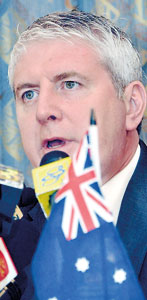News
Asylum seekers must clearly substantiate fleeing persecution: Aussie Minister
View(s):“Candid, constructive engagement is critical, and effective in achieving goals, hence Australia’s PM will attend CHOGM”
By Namini Wijedasa

Australian Minister of Immigration and Citizenship Brendan O’Connor
The number of Sri Lankan asylum seekers reaching Australia illegally by sea, declined dramatically in 2013. However, some recent boatloads that arrived directly from Sri Lanka, have caused renewed concern. Another group of 42 Sri Lankans were flown back from Christmas Island to Colombo last week, taking the total returned to the country since August 13, 2012, to 1,071. Of these, 862 were sent back involuntarily.
Visiting Australian Minister of Immigration and Citizenship Brendan O’Connor told the Sunday Times in an exclusive interview, that his Government will not grant asylum to any person who cannot substantiate that he/she is fleeing persecution at home.
Excerpts from the interview:
- Do you believe Tamils have a reason to flee Sri Lanka?
The Australian government makes decisions insofar as whether a person is afforded protection based on the facts of each person. We don’t determine based on ethnicity, we don’t determine based on the country of origin, we determine based on assertions made and whatever evidence we have to substantiate those assertions.
- Aren’t most people fleeing Sri Lanka for Australia of Tamil ethnicity?
That’s not necessarily the case. In fact, in terms of the returns, there are significant numbers of other ethnicities. This is what we do. We have the Refugee Convention. There’s a clear definition as to who should be afforded protection. We go through a rigorous process to ensure that we delineate those who are not to be afforded our protection, and we return them to country of origin. And those who may be afforded protection are processed in a different manner. I think that’s an entirely appropriate response, and we’ll continue to do it, because we don’t want people to endanger their lives, to waste their money, only to be returned home.
- Have you increased the number of asylum seekers you absorb legally?
We have increased our humanitarian placement programme from 13,750 to 20,000 per annum. That’s for all people around the world, but they must attract or engage our obligations under the Refugee Convention. There are many people who may choose to come to First World countries for a variety of reasons, but the only people who will fill those places are people who can clearly substantiate that they are fleeing persecution.
- Have the numbers of Sri Lankan asylum seekers reaching Australia through illegal means increased?
very significant rise last year. But there have been recently, some vessels that have arrived directly from Sri Lanka, and we want to make sure that we can reduce the chances of that happening. We think it’s too dangerous. It’s only allowing people to profit from other people and therefore, we will continue to work with Sri Lanka and its agencies to combat that, as we do with all other countries.
- Your developed country partners dwell on human rights, accountability and related issues in relation to Sri Lanka. Australia doesn’t. Would you say those governments are misguided?
No, Australia believes human rights are absolutely critical for any country; that we must ensure people are afforded dignity and respect and included in their society. I don’t think you can overstate the importance of those things. Without affording people sufficient rights, then society is not fully progressed. So it’s important that all countries do the right thing by their citizens.
- And yet, Australian policy seems focused more on development aid to Sri Lanka, and on creating a “productive partnership”. Why is there a difference in the way you approach Sri Lanka and how some other First World countries do?
We want to see this country progress. We want to see the people of Sri Lanka have a peaceful and economically beneficial future, one that all Sri Lankans can share in. That can happen only with economic development, with stability, and also with proper response, a full response, to the recommendations of the Lessons Learnt and Reconciliation Commission (LLRC) report. It is a very significant report, a set of benchmarks set by the government itself, and those should be realised. We made that very clear to the Sri Lankan Government. Yes, we will continue to work with this country in relation to aid. We want to provide support, so that there can be continued progress. But all of these elements matter.
- Australia was one of Sri Lanka’s strongest defenders at the recently concluded meeting in London of the Commonwealth Ministerial Action Group (CMAG). Did you “strike a deal with the devil” in exchange for support on migration matters?
I wouldn’t see it that way at all. We believe that engagement is absolutely critical. And whilst we are a friend of Sri Lanka, we have made very clear our concerns about the recommendations of the report (LLRC) being fully realised. We have said we want to see progress on that report (LLRC). And, yes, we support CHOGM (Commonwealth Heads of Government Meeting) being hosted by Sri Lanka. Yes, of course we will attend. We believe engagement—constructive, candid engagement—is a far more effective means to see some of the goals in this area achieved.
- Will your delegation to CHOGM be led by your Prime Minister?
That’s right, of course.
Follow @timesonlinelk
comments powered by Disqus




















